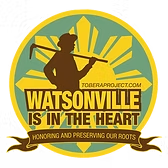
THE MADOLORA FAMILY
My father’s name was Santiago Madolora, “Ago” to his friends and “Sammy” to his bosses. Born on July 10, 1910 to a poor, large family in Northern Luzon, he was only able to complete a few years of school but was able to write his name and read.
At 16, he volunteered to go with his cousin to work in the pineapple plantations of Hawaii. He’d be one less mouth to feed and he could send money home. He left Hawaii and came to Watsonville to work in the fields.
My father joined the US Army in WWII, fought in the Philippines and was awarded a bronze star and US citizenship. After the war, he married my mother but my grandparents didn’t allow her to go with my father when he returned to the US. He came back in 1952 when I was born but my grandparents still did not allow us to go back with him. In 1957, they finally relented and my mother and I immigrated to join my father in Watsonville.
My father died in 1976 at the home he and my mother bought in Pajaro. One of the biggest regrets in my life was not talking to my father more and getting to know him better. I would have asked why and when did he leave Hawaii and come to Watsonville, did he witness the 1930 race riots, what was it like in the war for him? Reading America Is In The Heart was like seeing my father’s life in print.
My mother, Apolonia like my father had only a few years of education and was barely able to read and write. She had to go to night school to learn ESL and took classes to pass the test to become a naturalized citizen. My mother and I worked in the fields when I wasn’t in school. My sister, Veronica was born in 1958. I used to take care of her when our mother was at work at her second job at night in the canneries. My mother and sister took two trips to the Philippines. For reasons I can’t remember I decided not to go with them. I went to graduate school and was all set to go back to the Philippines for the first time to do field work for my dissertation but Martial Law was ordered in 1975.
My mother eventually left the fields to working the canneries exclusively. The canneries then closed down after Cannery Strike. Mymother used to tell me stories of walking the picket lines and confronting the police, amazingly radical for an immigrant woman whohad just become a citizen. She then started working as a home health aide for the In-Home Supportive Services program until sheretired in 2010. My mother passed away at my home in October 2017.
I took a leave of absence from Berkeley with a masters degree in Anthropology after my father died. I returned to Watsonville to stay with my mother so that my sister could go to college in Pomona. In 1977 I started working for a local non-profit helping farm workers start their own strawberry cooperatives. Shortly afterwards I joined the Board of Directors of the second bilingual, community radio station in California, KUBO FM Salinas. I left California briefly when I was selected for the first class of the National Rural Fellows program, an offshoot of the highly successful National Urban fellows. I went to Massachusetts where I got my second MA in Regional Planning and worked as an intern for the State of California Employment Development Department in Sacramento.
Returning to Watsonville, I worked briefly in Salinas for the Filipino Community of the Salinas Valley where I tried unsuccessfully toestablish a community based credit union. In 1984 I was hired as the Deputy Director of the Seniors Council/Area Agency on Aging and was chosen for the second class of Leadership Santa Cruz County. I was recruited to work as an Administrative Analyst for the County of Santa Cruz right after the Loma Prieta Earthquake in 1989. I eventually burned out and voluntarily demoted to a social work position in the social services department five years later.
I began working for the In-Home Supportive Services in 1994. It was a program providing household chores and non-medical personal care services to allow seniors to remain living safely in their homes in 1994. I tried to get as many Filipinos on my caseload as I could to make sure they received all the services to which they were entitled. I retired in 2009 but I still serve on the Board of Directors of Senior Network Services a local non-profit which provides information and links seniors to the services they need in Santa Cruz and San Benito counties.